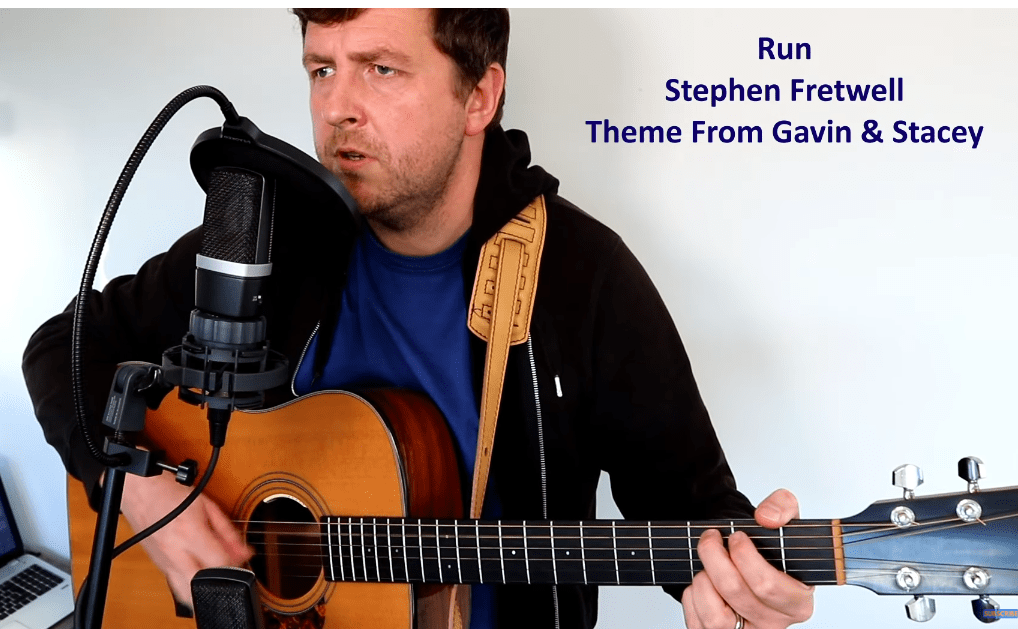While some songs fade into the background, others become deeply ingrained in the hearts of listeners, coming back when they’re most needed. The latter group includes Stephen Fretwell’s song “Run,” which not only tells a tale but also gives you the impression that you are living inside it.

“Run, run like the wind, don’t wait for a thing, there is nothing here for you,” is one of the opening lines. Fretwell creates a mood of gentle resignation, longing, and urgency. The austere yet profoundly poetic lyrics transport listeners to a place where they feel the need to flee but are unable to do so because of the weight of the past.
Stephen Fretwell: Key Information Table
| Attribute | Details |
|---|---|
| Song Title | Run |
| Artist | Stephen Fretwell |
| Album | Man on the Roof |
| Release Year | 2007 |
| Genre | Indie Folk |
| Primary Theme | Love, Regret, Vulnerability |
| Key Metaphor | A Beautiful Tree |
| Song Duration | 3:43 minutes |
| Label | Fiction Records |
| Available On | Spotify |
Interpreting the Lyrics: The True Meaning of “Run“
“Run, run like the wind, don’t wait for a thing”
The first phrase, which conveys a sense of haste and despair, strikes like a wind blast. There is a distinct sense of finality, as though the narrator has accepted the unpleasant reality that staying is not an option. The idea that escape is not only suggested but inevitable is reinforced by the run repetition, which works especially well.
But just who is being told to flee? Is it a lover, the storyteller, or maybe both? The song’s broad appeal is enhanced by its ambiguity, which makes it simple for listeners to extrapolate their own experiences onto the words.
“A beautiful tree, a beautiful tree, it’s a shame that the root of it’s me”
This line, which reinforces themes of self-awareness, remorse, and unintentional destruction, becomes the emotional center of the song. Trees are frequently associated with power, development, and longevity; but, in Run, the metaphor is tinged with sadness.
The speaker admits that although the tree might seem sturdy, its root system is defective. The tension between something lovely and something broken is incredibly well-expressed in this statement. Knowing that you might be the cause of something’s downfall, even if it was unintentional, can cause quiet destruction.
The Chorus: A Holding Back from Guilt and Acceptance
Fretwell’s repeated use of the line, “A beautiful tree, a beautiful tree, it’s a shame that the root of it’s me,” heightens the emotional impact of the song. It’s a line that stays with you, compels you to think, and doesn’t just go by.
The speaker accepts full responsibility for the harm done rather than shifting the blame or looking for atonement. As it cycles through remorse, accountability, and subdued grief, the chorus becomes into a confessional chant.
The Internal Conflict Between Remaining and Leaving
Contradictions abound in Fretwell’s Run. On the one hand, it exhorts the listener to flee, cut connections, and run. Conversely, there are lines that suggest a reluctance to fully let go:
“Tell me tomorrow, I’ll wait by the window for you”
The music feels incredibly genuine because of the juxtaposition between immediacy and endurance, running and waiting, and departure and longing. A portion of us still looks for an excuse to stay when we know we should leave something.
The Influence of Fretwell’s Music’s Simplicity
Run’s simple style is what gives it its striking beauty. For the music to have an effect, lavish production and intricate instrumentation are not necessary. Rather, it depends on:
- A soft acoustic guitar tune that creates a mood of melancholy intimacy.
- Minimal accompaniment that lets the words’ impact be felt unhindered.
- Fretwell’s eerie voice performance, which conveys both tenderness and subdued sadness.
This minimalist production works quite well, demonstrating that when it comes to delivering an emotional story, sometimes less is more.
Why “Run” Still Has Meaning Years Later
Due in great part to its worldwide appeal, Run has managed to retain its profound emotional significance while many other songs fade from memory. Almost everyone has experienced the themes of regret, responsibility, and painful self-awareness at some point.
After appearing in television and movies, the song’s eerie quality effectively accentuates situations of loss, change, and unresolved emotions, bringing it newfound popularity. Run feels timeless, in contrast to songs associated with a certain era, guaranteeing that it will continue to resonate with new listeners of all ages.
The Silent Strength of “Run”
Run by Stephen Fretwell is an experience rather than merely a song. It is a monument to the power of simplicity in music, with its poetic lyricism, subtle melody, and emotionally charged core that feels incredibly human.
The tune pulls you in rather than demanding your attention. It allows you to feel things on your own terms rather than telling you how to feel them. And for that same reason, “Run” still has an impact on listeners all over the world years after it was first released.
FAQs About ‘Run’ by Stephen Fretwell
What is the meaning behind ‘Run’?
The song explores regret, self-awareness, and emotional escape, with the recurring tree metaphor symbolizing something beautiful that the narrator believes he has damaged.
Why is ‘Run’ frequently used in film and television?
Its melancholic yet hopeful tone makes it perfect for scenes involving reflection, change, or heartbreak, adding emotional depth to visual storytelling.
What does the ‘beautiful tree’ represent?
The tree symbolizes growth, love, and stability, while its root—representing the narrator—signifies a sense of personal failure or regret.
Has Stephen Fretwell explained the song’s meaning?
Fretwell has remained relatively private about his songwriting process, allowing listeners to interpret the lyrics in their own way.
Why does ‘Run’ continue to resonate with so many people?
Its raw honesty, poetic simplicity, and deeply relatable themes make it a song that sticks with listeners long after it ends.
